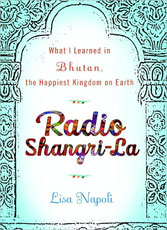"Despite its isolationism, Bhutan had been at the vanguard in other ways. Long before the rest of the world started flaunting environmental concerns as a trendy marketing strategy, Bhutan's king had been winning awards for his genuine commitment to conservation. Clear-cutting was not allowed, and if a single tree was chopped, three had to be planted in exchange. By royal covenant, he had committed that 60 percent of Bhutan's forests would always be preserved. Unlike many Asian countries, Bhutan had not been transformed into a giant pollution-generating smokestack, nor was it overpopulated, with only 650,000 citizens. It was poor, but it prided itself on the fact that no beggars were on its streets. Babies weren't left on the doorsteps of orphanages; such institutions didn't exist. Everyone had roofs over their heads and something to eat. The people took care of one another. A royal form of welfare called kidu allowed citizens in the most dire circumstances to petition the king for help.
"Perhaps the most unusual and intriguing aspect of this Land of the Thunder Dragon was its attitude toward development and consumerism — the policy that catapulted Bhutan to the formidable (if unqualifiable) distinction as a place populated with supremely happy people. Instead of measuring its economic progress by calculating the gross national product — a complex matrix detailing the monetary value of what a country churns out — His Majesty created a different scale. He proclaimed this philosophy, ironically, poetically, 'Gross National Happiness.' Economic progress at any cost, went the thinking, was not progress at all. Any force that threatened Bhutan's traditions or environment was cause for concern — and not worth inviting into the country. The well-being of the people was to be considered before the sheer generation of goods and cash, before rampant growth just for the sake of an upward slope on a graph. Quality of life was to take precedence over financial and material success. Compassion toward and cooperation with your fellow citizens was fundamental, essential, rather than mowing down the other guy with abandon so you could succeed.
"Social scientists and economists around the globe curiously studied GNH and this place that because of it had been dubbed 'the happiest place on earth.' What would the New York City couples buying $2.7 million apartments with nannies to assist their nannies think about these ideals? How about the audience and staff of the radio show where I worked, where the theme was money and business? Being, not having. Happiness above wealth. It sounded great to me; Bhutan certainly appeared to have its priorities straight. At least, it seemed to have the same priorities I was craving more of in my world.
"Could it be real? Or was it brilliant sloganeering, a marketing mirage? Maybe I'd figure out a way to get to Bhutan one day, to find out for myself."
